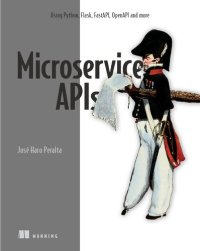
Ebook: Microservice APIs: Using Python, Flask, FastAPI, OpenAPI and more
Author: José Haro Peralta
- Genre: Computers // Programming: Libraries API
- Tags: Security, Python, Web Applications, Microservices, Docker, GraphQL, Flask, API Design, Kubernetes, Software Architecture, Testing, Serverless Applications, REST API, AWS Aurora, OpenAPI, Authentication, FastAPI
- Year: 2023
- Publisher: Manning Publications
- City: Shelter Island, NY
- Edition: 1
- Language: English
- pdf
Strategies, best practices, and patterns that will help you design resilient microservices architecture and streamline your API integrations.
In Microservice APIs, you'll discover:
• Service decomposition strategies for microservices
• Documentation-driven development for APIs
• Best practices for designing REST and GraphQL APIs
• Documenting REST APIs with the OpenAPI specification (formerly Swagger)
• Documenting GraphQL APIs using the Schema Definition Language
• Building microservices APIs with Flask, FastAPI, Ariadne, and other frameworks
• Service implementation patterns for loosely coupled services
• Property-based testing to validate your APIs, and using automated API testing frameworks like schemathesis and Dredd
• Adding authentication and authorization to your microservice APIs using OAuth and OpenID Connect (OIDC)
• Deploying and operating microservices in AWS with Docker and Kubernetes
Microservice APIs teaches you practical techniques for designing robust microservices with APIs that are easy to understand, consume, and maintain. You'll benefit from author José Haro Peralta's years of experience experimenting with microservices architecture, dodging pitfalls and learning from mistakes he's made. Inside you'll find strategies for delivering successful API integrations, implementing services with clear boundaries, managing cloud deployments, and handling microservices security. Written in a framework-agnostic manner, its universal principles can easily be applied to your favorite stack and toolset.
About the technology
Clean, clear APIs are essential to the success of microservice applications. Well-designed APIs enable reliable integrations between services and help simplify maintenance, scaling, and redesigns. This book teaches you the patterns, protocols, and strategies you need to design, build, and deploy effective REST and GraphQL microservices APIs.
About the book
Microservice APIs gathers proven techniques for creating and building easy-to-consume APIs for microservices applications. Rich with proven advice and Python-based examples, this practical book focuses on implementation over philosophy. You'll learn how to build robust microservice APIs, test and protect them, and deploy them to the cloud following principles and patterns that work in any language.
What's inside
• Service decomposition strategies for microservices
• Best practices for designing and building REST and GraphQL APIs
• Service implementation patterns for loosely coupled components
• API authorization with OAuth and OIDC
• Deployments with AWS and Kubernetes
About the reader
For developers familiar with the basics of web development. Examples are in Python.
About the author
José Haro Peralta is a consultant, author, and instructor. He's also the founder of microapis.io.
In Microservice APIs, you'll discover:
• Service decomposition strategies for microservices
• Documentation-driven development for APIs
• Best practices for designing REST and GraphQL APIs
• Documenting REST APIs with the OpenAPI specification (formerly Swagger)
• Documenting GraphQL APIs using the Schema Definition Language
• Building microservices APIs with Flask, FastAPI, Ariadne, and other frameworks
• Service implementation patterns for loosely coupled services
• Property-based testing to validate your APIs, and using automated API testing frameworks like schemathesis and Dredd
• Adding authentication and authorization to your microservice APIs using OAuth and OpenID Connect (OIDC)
• Deploying and operating microservices in AWS with Docker and Kubernetes
Microservice APIs teaches you practical techniques for designing robust microservices with APIs that are easy to understand, consume, and maintain. You'll benefit from author José Haro Peralta's years of experience experimenting with microservices architecture, dodging pitfalls and learning from mistakes he's made. Inside you'll find strategies for delivering successful API integrations, implementing services with clear boundaries, managing cloud deployments, and handling microservices security. Written in a framework-agnostic manner, its universal principles can easily be applied to your favorite stack and toolset.
About the technology
Clean, clear APIs are essential to the success of microservice applications. Well-designed APIs enable reliable integrations between services and help simplify maintenance, scaling, and redesigns. This book teaches you the patterns, protocols, and strategies you need to design, build, and deploy effective REST and GraphQL microservices APIs.
About the book
Microservice APIs gathers proven techniques for creating and building easy-to-consume APIs for microservices applications. Rich with proven advice and Python-based examples, this practical book focuses on implementation over philosophy. You'll learn how to build robust microservice APIs, test and protect them, and deploy them to the cloud following principles and patterns that work in any language.
What's inside
• Service decomposition strategies for microservices
• Best practices for designing and building REST and GraphQL APIs
• Service implementation patterns for loosely coupled components
• API authorization with OAuth and OIDC
• Deployments with AWS and Kubernetes
About the reader
For developers familiar with the basics of web development. Examples are in Python.
About the author
José Haro Peralta is a consultant, author, and instructor. He's also the founder of microapis.io.
Download the book Microservice APIs: Using Python, Flask, FastAPI, OpenAPI and more for free or read online
Continue reading on any device:

Last viewed books
Related books
{related-news}
Comments (0)